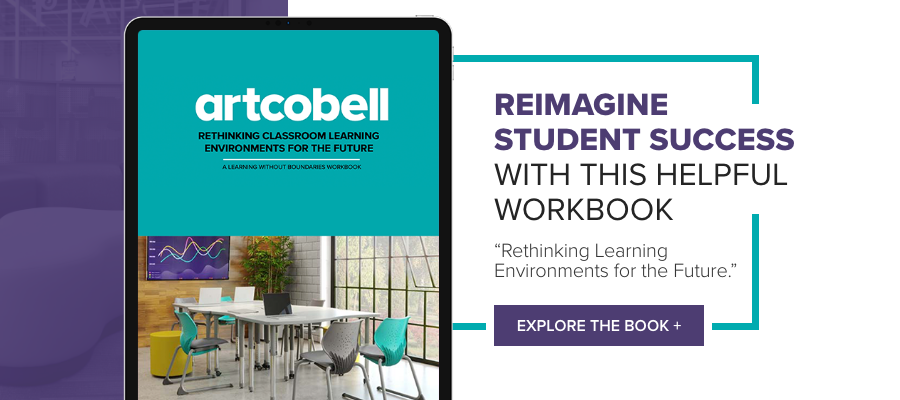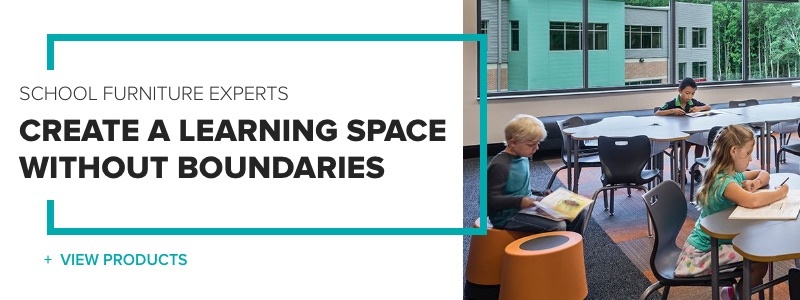How to Establish an Active Learning Classroom
Educators around the country are eager to adopt new learning strategies that match the needs and constraints of the modern, connected world. However, the problem they encounter is that while teaching methods can easily change, creating the right active learning classroom to optimize the experience is a bigger challenge. It’s much easier for teachers and students to adopt active learning techniques when the classroom is arranged to support that style of learning.
A total classroom conversion from traditional, lecture-based arrangement to a living or active learning classroom can be overwhelming. Here’s the good news – the conversion doesn’t have to be done all at once, and there are simple steps you can take to make the conversion more manageable.
It all starts with understanding what active learning is and how your classroom can be arranged to best support it. So, we’ve broken down the active learning zones to discover what’s most important and why it’s worth the effort to create an active learning classroom your students can thrive in.
Before you dive into this topic, it might help to read more on the different zones of the Living or Active Classroom, here.
The Case for Establishing an Active Learning Classroom
An active learning classroom engages students in the learning process, and it requires them to be responsible for their cognitive development. Teachers who support and encourage self-directed and active learning strategies design lessons to have students cognitively engage with the material. Students can no longer sit passively in the classroom.
It’s understandable that a traditional, lecture-based classroom layout is not as conducive to active learning methods. Active learning classrooms require flexibility when it comes to desk arrangement and being able to switch from an individual to a group layout as the curriculum changes.
Here are some examples of how teachers can incorporate active learning strategies into their curriculum:
- Build a personal PLN (Personal Learning Network) using tools, such as blogs, journals, Netvibes, LinkedIn, Twitter, and Facebook.
- Create personal learning tools and modules, or collaborate with educators around the world to improve curriculum using platforms, like OER Commons.
- Design a personal PLE (Personal Learning Environments) using tools such as Symbaloo, email, or ePortfolio.
Creating an Active Learning Classroom: Re-Thinking Layouts
In the pre-digital age, most of our learning took place solely in the classroom and was controlled by a teacher. But in today’s world, we are heavily influenced by outside sources, including YouTube, Google, Wikipedia, Siri, blogs, and social media content.
With so many students engaged in remote learning due to the lasting effects of the COVID-19 pandemic, it's paramount teachers engage students using technology to promote active learning remotely. You may be asking yourself questions like, What do we take away from this experience and how can we apply it as students return into the classroom setting? How can we build upon the transition to self-directed learning? What is the result of this cultural and technological shift?
The reality is, the modern classroom is changing. The learning revolution is transforming the way we teach, learn and, in turn, how we arrange classrooms.
Related Article: What's a Living Classroom & How it Promotes Active Learning
Practical Setup Ideas for Creating An Active Learning Classroom
- Add casters to your tables, desks, and chairs for easy mobility and to enhance your flexible learning space. This addition allows you to quickly and easily reconfigure spaces for individual or group work. Design “pods” of shape tables and desks that can accommodate 2-person, 4-person, 8-person, 10-person, etc. setups.
- Flip-Top tables and desks with marker board tops allow you to create an individual workstation that can easily be transformed into a presentation space, allowing students the ability to take control of their own learning. This gives students the tools they need to present learning modules and retain the information they're learning.
- Individual Teacher Workstations can easily be incorporated into collaborative configurations. Combine the Nebula Shape Table (teacher station) with the 3P-120 Shape Tables and adaptable seating solutions to create a flexible learning environment that can accommodate up to 12 people. When you need a space for individual or small group work, break them apart and move accordingly.
- Use BLOC & STP to create a fun and active learning classroom! Since BLOC & STP can be used from all sides, they are versatile and accommodating. Combine these with MOV and FLOT to create truly dynamic and innovative learning spaces. Also, use these pieces of classroom furniture together as casual seating, tables, or even as impromptu work surfaces. Mix and match the various shapes and sizes for creative, collaborative learning.
Get Started Building Your Active Learning Classroom
Today’s classrooms are smarter, more connected, and adaptive to a range of learning styles. This shift requires classroom furnishings that support active learning environments and provide educators vital options to help them create the right learning environment for their students.
To learn more about how schools are approaching classroom conversions, or to map out the plan for your own classroom, download our Collaborative Conversion Workbook, or visit with one of our local partners.
Recent Posts
In part one of our series on thoughtful classroom design, we heard an educator’s perspective on...
In part one of our series on thoughtful classroom design, we heard an educator’s perspective on...

